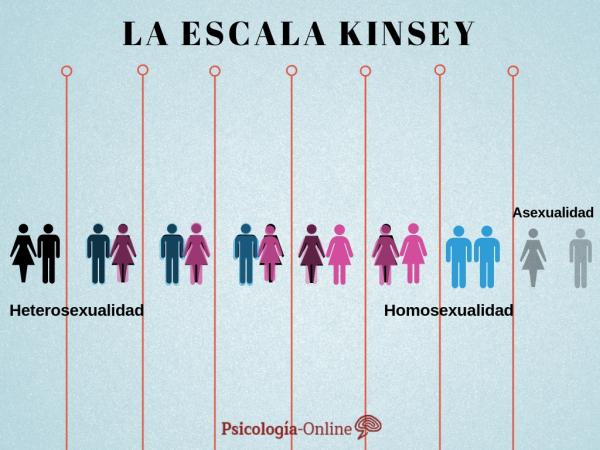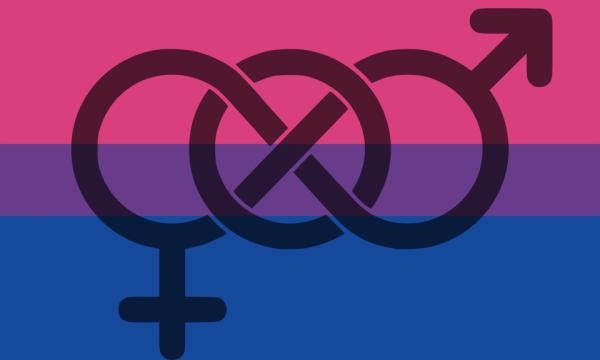If you are wondering what to do if your partner is bisexual you surely have many questions, and even doubts about whether you are with the right person or you may be afraid that at some point he or she could leave the relationship and replace you with another person of the same sex.
It is normal to a certain extent that this happens to you, especially if your partner has just confessed it to you, so right now you may be feeling confused and that same confusion causes you to not be able to perceive things in any other way and to feel blocked. It is for this reason that in this PsychologyFor article: My partner is bisexual, what do I do? We are going to inform you more about the topic of bisexuality and sexual orientation to finally provide you with a series of tips that will undoubtedly help you know what to do and how to react to this situation you are going through.
What is sexual orientation?
When we talk about sexual orientation we refer to the attraction we feel towards other people This type of attraction can not only be physical or sexual but can also be emotional, romantic and affective. sexual orientation It has nothing to do with biological sex of the person, your sexual identity (the way in which a person identifies psychologically, whether male or female) or with the social role that he or she exercises (cultural roles of masculine or feminine behavior).
According to some pioneers of this type of studies, such as the creators of the Kinsey sexual orientation scale, people can have different types of sexual orientation and we can classify them simply in this way:
- People who are attracted to others of the opposite sex who are considered as heterosexual
- People who are attracted to others of the same sex, called homosexuals In the case of men, they are considered gay and women are called lesbians.
- People who may feel attracted to others of both sexes who are called bisexual This type of sexual orientation can also be attracted to people with a different gender identity, such as transgender men and women, intergender, agender, etc.
- People who do not feel any type of sexual attraction towards someone who are usually called asexual
It is important to mention that many people do not feel identified by any label (bisexual, homosexual, lesbian, etc.), on the contrary, others feel more comfortable when they assign themselves a certain label. Sexual orientation can remain the same throughout life but also can sometimes vary depending on who you feel attracted to or with whom you are having an active relationship.

False myths about bisexuality
Due to the lack of information that exists on these topics and partly also to social prejudices, a series of myths have been created about bisexuality that are actually quite far from reality and that it is important that we identify. In fact, if you’re wondering what to do if your partner is bisexual l, it will surely be due to fears derived from these myths. Among the most frequent are the following:
- Promiscuity. It has been said that people considered bisexual are promiscuous since they are attracted to both sexes. However, there is no relationship between a person’s sexual and/or emotional attraction with promiscuity.
- Confusion. It is said that bisexual people are confused and that this is why they are attracted to both sexes.
- They are attracted to both sexes with the same intensity. A bisexual person, just like a heterosexual would, may feel more or less attracted to one person than another. Just because they are bisexual does not mean that they will not care about having relationships with all people.
- More venereal diseases or STDs. It is thought that bisexual people are more likely to suffer from some of these diseases, however nothing could be further from the truth since a heterosexual person can have the same possibilities as them if they do not take the necessary precautions when carrying out the act. sexual. So it does not depend on sexual orientation but on the care and precaution that the person takes, which is independent of who they have sexual relations with.
- Infidelity. It is said that bisexual people are more unfaithful since they are attracted to both sexes, however, this has nothing to do with it even though they have more possibilities of choice (men and women). It is more about commitment and loyalty to the person you love.

My partner is bisexual: what do I do?
Next, I will give you some tips and recommendations that you can take into account to help you know what to do in this situation that has you baffled right now.
Stop and reflect on how you feel.
This news may have been totally unexpected and you are in a state of shock right now, especially because you have never found yourself in a similar situation. However, this very fact that it has never happened to you before or that perhaps you are not well prepared or well informed and have certain ideas or prejudices about this topic, is making you feel a lot of discomfort and confusion.
Therefore, it is important that you stop and give yourself space to reflect on how you feel, what doubts or ideas you have regarding the topic of bisexuality, What are the things that worry you the most? about your partner being bisexual, etc. Try to clarify your feelings and thoughts very well before moving on to the next step, which would be to talk to your partner.
Talk to your partner
Let your partner know with all sincerity and respect the way you feel at the moment, what your doubts and fears are in this regard or what they were and that you have now resolved and try to have all these issues clarified by your partner and understood by you. For example, if because of this you have begun to question whether your partner would like to formalize the relationship more like you and you had never asked him before, dare to do so and clear all your doubts (and hers, of course). That is to say, just because they are bisexual, they are not going to let them have a formal relationship or not, you could also tell them about this if they were heterosexual, it is always good. know the expectations that are in a relationship. Discover here how to improve communication between couples.
Votes of confidence
Remember that the fact that your partner is bisexual and has confessed it to you is a sign of the level of trust he or she has in you and is an aspect that must also be valued. Think that not only because your partner is bisexual, your relationship will have less “weight” so to speak than if you were with someone heterosexual.
Fidelity, trust and love per se, They have nothing to do with sexual orientation of the person, so if your partner is showing you that he wants to be with you and that he feels comfortable in the relationship, you don’t have to distrust him. The chances that she has of being unfaithful to you or that you are unfaithful to her are the same as if your partner were heterosexual, as we saw previously, one thing has nothing to do with the other. This depends on factors such as level of commitment, personal values, respect, among others independent of sexual orientation.
Take one decision
After giving yourself space to think, having spoken with your partner, after they have resolved all your doubts and they have shared their ideas and expectations about your relationship, it is important that you are very clear about your ideas and feelings and also make the best decision. decision for you. Remember that the important thing is that act in coherence with yourself and that you feel comfortable and calm in any relationship you decide to be in.
This article is merely informative, at PsychologyFor we do not have the power to make a diagnosis or recommend a treatment. We invite you to go to a psychologist to treat your particular case.
If you want to read more articles similar to My partner is bisexual: what do I do? we recommend that you enter our Couples Therapy category.
Bibliography
- Bisexuality. (2015, November 3). Retrieved January 9, 2019, from https://cuidateplus.marca.com/sexualidad/diccionario/bisexualidad.html
- Planned Parenthood. (sf). What is sexual orientation? Retrieved January 9, 2019, from https://www.plannedparenthood.org/es/temas-de-salud/orientacion-sexual-y-genero/orientacion-sexual








